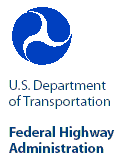For More Information: https://ops.fhwa.dot.gov/freight/index.cfm
Contact Information: FreightFeedback at FreightFeedback@dot.gov
This publication is an archived publication and may contain dated technical, contact, and link information.
Printable
Version [PDF 201KB]
![]() You will need the Adobe
Acrobat Reader to view this PDF.
You will need the Adobe
Acrobat Reader to view this PDF.

Electronic Freight Management (EFM) Standards Strategy
The EFM initiative is a U.S. Department of Transportation (DOT) sponsored research effort aimed at improving the operating efficiency, safety, and security of freight movement. The initiative involves conducting a deployment test using Web services technologies to share information between supply chain partners in a commonly understood manner and to eliminate unnecessary paperwork.
The Web services technologies will be implemented in a service-oriented architecture (SOA). Data standards are essential in this environment and allow business partners to share information on a real-time basis. The EFM initiative hinges on the successful definition and adoption of international data standards published in open and accessible forums.
With the tremendous growth in the globalization of trade and paperless e-commerce, standards are more important than ever before. Many organizations are working on developing and establishing standards for e-business in general and for freight movement in particular. However, a common standard has not yet emerged to facilitate intermodal freight movement. There is a strong need to find consensus among standard development organizations to enable the alignment of standards for freight productivity, safety, and security.
The proof-of-concept test for the EFM initiative offers an opportunity to test an international standard in an operating environment. The EFM standards strategy focuses on working with international standards development and implementation organizations to establish a transport dataset standard in 2006 that can be used in this test. A test of this nature could prove beneficial to standards organizations, especially if they team with DOT and its partners on the detailed test design and provide input to the project evaluation plan. There may be key features the standards development organizations would like to see tested and evaluated.

Key Groups Aligning Freight Data Standards
United Nations Centre for Trade Facilitation and Electronic Business (UN/CEFACT) contributes to the development of freight standards through such work as UN/CEFACT Modeling Methodology, Business Requirements Specifications, and various instruments such as UneDocs, the core component library and a message assembly framework.
Organization for the Advancement of Structured Information Standards (OASIS), a not-for-profit, international consortium, drives the development and adoption of e-business standards. Its Universal Business Language Technical Committee is developing standardized XML documents for use in freight domains.

World Customs Organization (WCO) provides strong support to organizations involved in electronic data sharing initiatives. Its version 2.0 Data Model that includes message structures is used by Customs organizations throughout the world.
International Air Transport Association (IATA) sponsors initiatives to improve the efficiency of freight transport. Its new initiative, called eFreight, is similar to EFM and may be helpful in a partnership demonstration of intermodal freight standards. The initial focus of eFreight is the elimination of paper to process freight. IATA anticipates using EDI messages to accomplish its goal and is also interested in the development of XML messages.
Cargo 2000, with IATA affiliated members, creates business process and quality measurement standards for air cargo movement, allowing detailed route plans for each shipment, which then allows performance and quality to be measured on a continuing basis. An emerging relationship with RosettaNet will help extend these standards into a broader supply chain environment.
For more information, please contact
Michael P. Onder
Michael.Onder@dot.gov
202-366-2639
April 2006
FHWA-HOP-06-099
EDL 14285

Office of Freight Management and Operations, 400 7th Street, SW, Room
3401, Washington, D.C. 20590
https://ops.fhwa.dot.gov/freight,
Toll-free help-line 866-367-7487